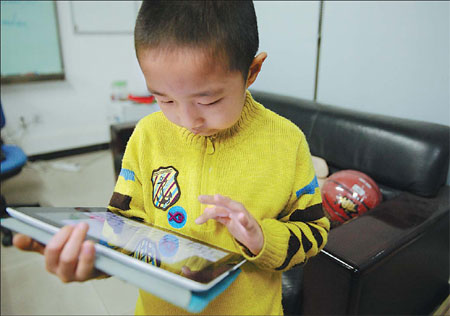Tablet taboos
 |
|
Wei Xiaohao / China Daily |
Keep the iPad away from the very young and ration the time children spend playing on tablet computers. Why? The child could develop anti-social behavior, eyesight problems and bad posture leading to back problems. Liu Zhihua and Sun Ye report.
The iPad or any other tablet computer should not be used as a surrogate nanny, even if they keep the child occupied and quiet. And while early computer skills may give the young an advantage in learning, it may also pose potential health risks.
More observant parents are discovering that their children are getting addicted to screens too young as more families in China own a plethora of gadgets and an increasing number of toddlers and young children gain access to these digital devices.
For the parents, tablets such as the iPad are double-edged swords. On one hand, they can be used as an educational tool, an entertainment platform and even a baby-sitting option. But they are also fearful of the potential threats and consequences.
Tong Lei, 33, a purchasing executive and father to a 3-year-old girl in Shanghai, says he always tries to limit his daughter's iPad time.
Related: Child heart device keeps 90 percent children alive
He gives the toddler an iPad only when there is no other way to make her happy and he tries to divert her attention away from the tablet as soon as she has stopped crying.
"I never allow her to play longer than 15 minutes every time," Tong says. "Babies love the iPad and it is an efficient way to entertain and appease them, but it harms their young eyes."
Tong also feels that keeping up with all the new apps that appear on the iPad may influence his daughter's concentration and make her too distracted.
He is also fearful of news reports that young children are suffering from early vision defects and degeneration of cervical vertebrae due to hunching over the tablets or computers too long.
Beijing resident Zhang Huihui recently managed to wean her 6-year-old son off the devices mainly because of health reasons, but it was a tough process.
Since she bought an iPad a year ago, her son played with it for at least 30 minutes every day.
Related: Give children right recognition for luxury
At first, Zhang found it convenient, because the boy would watch cartoons quietly by himself, and saved her from having to pay him constant attention.
Later, however, she found that he had become addicted, turning on the tablet himself and watching the same cartoons over and again. She downloaded some educational apps to distract him from the cartoons, but they soon lost their novelty and he was back watching the cartoons.
"I thought about not allowing him to use the iPad anymore, but I dropped the idea after I realized how important it was to him. Even his father liked to play games on it," Zhang says.
"I was also afraid he would be excluded from his friends and classmates' discussions, if they played the iPad while he did not."
Her son exchanges Angry Birds and Plants vs Zombies toys and apps with his peers.
Zhang knows how popular and powerful iPad is. But there is another trend that worries her.
She has noticed that at nearly every party she goes to, children ranging from 2-year-olds to teenagers play on their iPad or smartphones by themselves, and don't speak or mix with others.
Last month, her son was diagnosed with an eye infection and Zhang finally decided not to let him play on the iPad again, even after his eyes are fully recovered.
Related: Paternal smoking linked to leukemia in children
"My son tends to be allergic to many things and I have to be careful. The doctor said he couldn't say if the iPad caused the infection, but it would definitely make it worse," Zhang says.
"So I told him I had to take it away for work, and he adjusted to life without an iPad much easier than I had expected, although he whined about it every morning and evening in the first week."
While Zhang's case is an extreme one, when it comes to their child's wellbeing, parents always try their best.






















